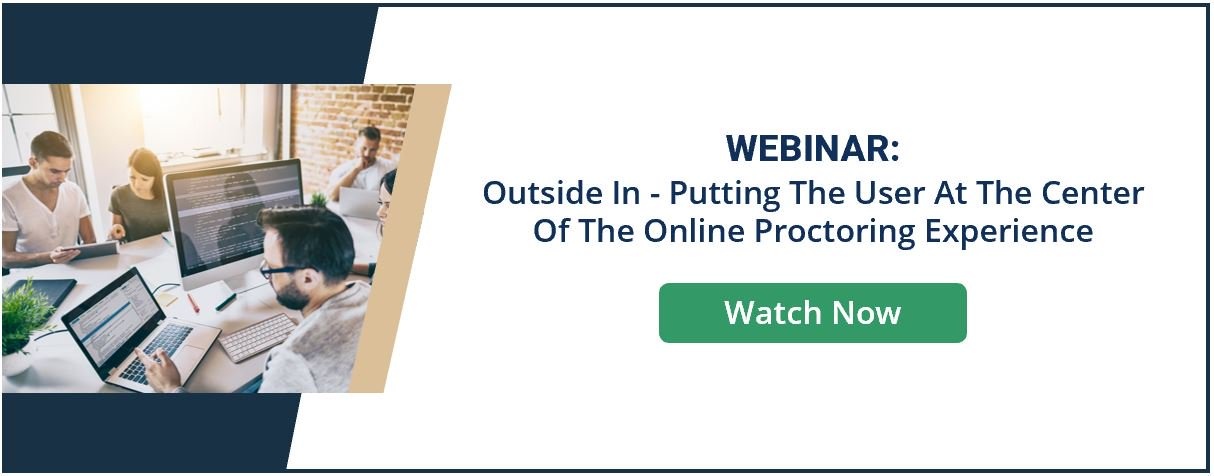The Chronicle of Higher Education recently reported that following her research on the performance of online and in-class students, associate professor of agribusiness and applied economics at North Dakota State University, Cheryl J. Wachenheim’s recommends that online students be required to take proctored final exams to prevent what appears to be higher incidents of cheating.
The economics professor’s research demonstrates that students taking online unproctored exams perform better than when they sit for exams before a proctor enforcing the closed-book exam rules.
In other words, more students cheat when taking exams unproctored, online at home, shocker!
Professor Wachenheim’s research is valuable. Hopefully, more academic institutions will soon acknowledge that without putting a plan in place to address the ease with which online students can cheat, they will damage the integrity of their online programs.
Students cheat. I am not commenting on the reasons for it, or the relative harm of the act – simply stating a fact. Similarly, underage people drink alcohol, and drivers speed. Just as bars are required to check ID’s and police monitor speeds, so too should schools act to prevent cheating. I would like to use the announcement of Professor Wachenheim’s research as an opportunity to comment on another alarming trend related to academic integrity and education.
In the last two years, the debate about academic integrity among and within academic institutions has focused on the 2008 Higher Education Opportunity Act. The legislation contains a requirement that schools offering distance learning programs have a system in place to authenticate the identity of their online students. Clearly the intention of this provision is to prevent students from having someone else do their work — a form of cheating. While it may be obvious to a layperson, even if you make sure the correct person is taking the exam, and doing the work for which credit is assigned, that person might cheat, especially when they are taking an unproctored online exam.
For more than ten years, PSI has designed and sold software systems that prevent cheating in computer-based exams administered in traditional education and certifications. Five years ago we started focusing on the distance learning space. Our remote proctoring offerings were specifically designed to enable institutions to offer distance learning exams with the same level of academic integrity as the traditional proctored examinations. We both authenticate the identity of the student, and prevent cheating.
Read more: A Comparative Study of Online Remote Proctored vs Onsite Proctored High Stakes Exams
We are now seeing schools look for ways to authenticate their online students as a way to stop cheating. In some recent cases, faculty have come to us concerned that students were cheating. They wanted to evaluate technology that stopped cheating, yet their evaluations were suspended by administrators that concluded that the school merely look at authentication systems, (usernames and passwords, challenge questions). Authenticating the ID of a test-taker but doing nothing to prevent that student from cheating is a little like checking someone’s blood alcohol level before they go to the party, or putting a speed track in someone’s driveway.
If there is no system in place to prevent cheating, a good number of students will cheat. This is not a surprise. The surprise is the number of schools that are not addressing this fact, or claim they are addressing the fact by focusing on the requirements set by Congress in the HEOA. Traditional learning environments embraced a system to enforce exam rules and protect academic integrity — human proctors. Online learning is literally changing the world. The convenience of online learning makes intellectual and practical knowledge available to everyone. While online learning is a new delivery methodology, the need to enforce exam rules and protect academic integrity still exists. Fortunately, technology is available to address the issue. Students can still take exams with integrity while embracing the convenience of online education, and do so cost effectively.
As Professor Wachenheim’s research states, it’s time to accept the obvious. . . . students cheat – and you need to put in place a solution to address it.


 Douglas M. Winneg is the Executive Vice President, PSI Services LLC. Doug has worked in the Academic and Certification Assessment space for 18 years. Both as head of the PSI Services Education group, and prior to that as CEO and founder of Software Secure, acquired by PSI in 2016, Doug has designed assessment systems and services with a single objective, to promote test integrity. As CEO of Software Secure, he was the designer of the company’s patented Securexam Lockdown technology and Remote Proctor products.
Doug has lead the design of secure computer-based testing systems for higher education and K-12 online education programs and national certification providers in the United States, Canada, The Netherlands and The United Kingdom, Australia and South Africa.
Doug received his J.D. from the Benjamin N. Cardozo School of Law, and a Bachelor of Arts with Honors from Swarthmore College.
Douglas M. Winneg is the Executive Vice President, PSI Services LLC. Doug has worked in the Academic and Certification Assessment space for 18 years. Both as head of the PSI Services Education group, and prior to that as CEO and founder of Software Secure, acquired by PSI in 2016, Doug has designed assessment systems and services with a single objective, to promote test integrity. As CEO of Software Secure, he was the designer of the company’s patented Securexam Lockdown technology and Remote Proctor products.
Doug has lead the design of secure computer-based testing systems for higher education and K-12 online education programs and national certification providers in the United States, Canada, The Netherlands and The United Kingdom, Australia and South Africa.
Doug received his J.D. from the Benjamin N. Cardozo School of Law, and a Bachelor of Arts with Honors from Swarthmore College.